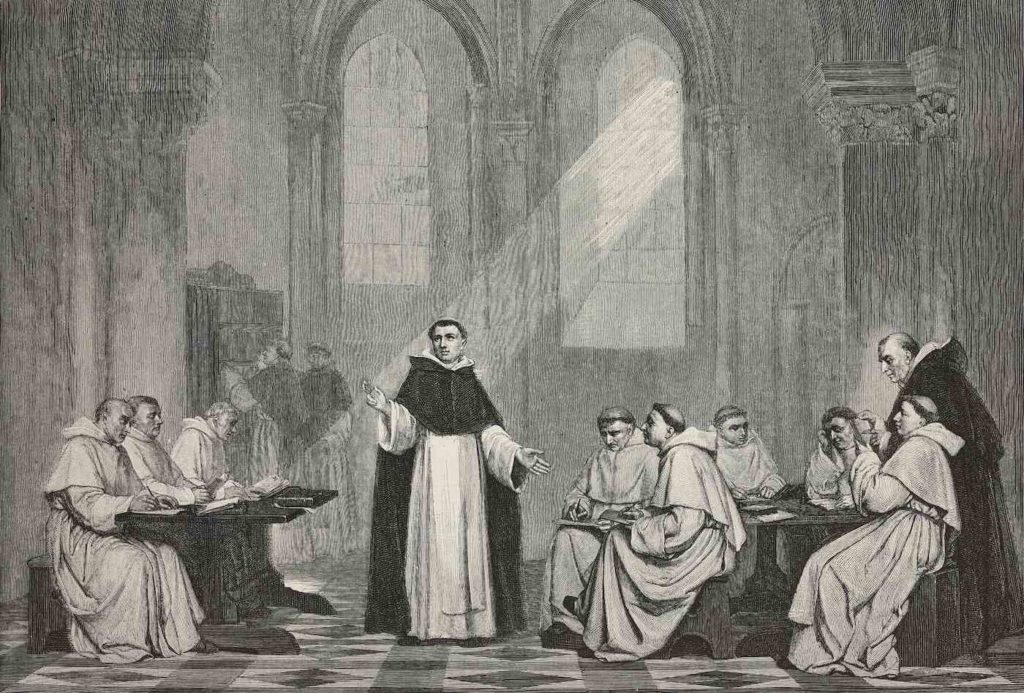This essay is part of a week-long series drawn from the Witherspoon Institute’s project on Natural Law, Natural Rights, and American Constitutionalism. Click here to read PD Editor-in-Chief R.J. Snell’s introduction to the series.
Thomas Aquinas is generally regarded as the West’s pre-eminent theorist of the natural law, critically inheriting the main traditions of natural law or quasi–natural law thinking in the ancient world (including the Platonic, and particularly Aristotelian and Stoic traditions) and bringing elements from these traditions into systematic relation in the framework of a metaphysics of creation and divine providence. His theory sets the terms of debate for subsequent natural law theorizing.
The fundamentals of Aquinas’s natural law doctrine are contained in the so-called Treatise on Law in Thomas’s masterwork, the Summa Theologiae, comprising Questions 90 to 108 in the first part of the second part of the three-part Summa.[1] Thomists have rightly expressed reservations about the procedure of surgically extracting the teaching in those Questions (or often the more strictly philosophical Questions 90 to 97) and representing it as Thomas’s natural law thinking tout court. Indeed, there is less possibility of distorting Thomas’s theory if one is careful to read the Treatise on Law in the context of the conceptual architecture of the Summa Theologiae as a whole.
The Summa is Thomas’s mature theological synthesis, aimed at providing beginners in theology with a systematic, overall account of both the divine nature, as knowable by faith-enlightened reason, and the divine plan and work of creating and redeeming the cosmos and ordaining it to a final transfiguration in glory at the end of history. Thomas’s method in composing the work, as he states in the work’s Prologue, is to treat of the whole of revealed theology (sacra doctrina) as briefly and clearly as possible, but according to a strict order whereby the very contours of the subject matter of the science dictate the architectonic plan and the sequential treatment of questions within the work. The first Question of the Summa so treats the nature and scope of theology itself, and once this is established, the work considers the very existence and nature of God: God first in His own inner and Trinitarian life, and then in His external activity of giving being to creatures and ordaining them to perfection or full realization for the manifestation or communication of His own glory.
Start your day with Public Discourse
Sign up and get our daily essays sent straight to your inbox.The Summa and theology itself are all about God. The divine nature is the subject matter of the science[2], and the very first principles or premises that serve as inferential starting points in the systematic inquiry of theology are those items that God has revealed to us concerning His nature and His plan and purpose in creating the cosmos.[3] God Himself and subsequently all creation are studied in the light of these starting points or first principles. In the order of the Summa, the first part of the work treats the divine nature in itself and then the free creative production of creatures by God (angels, humans, and all other animate and inanimate beings). The second part treats the grace-aided attainment of a cognitive-affective union with God by human activity (which union represents the fullest realization of human nature, as we shall see), and the third part treats Christ and his Church and sacraments, the necessary means for man’s union with God.
Law, of its various sorts, has a role to play in humans’ full realization of their nature by free acts (acts over which they have a certain degree of control and dominion). What role? To ask this question is to seek to grasp Thomas’s natural law teaching in the context of his overall metaphysical cosmology. According to Thomas, human nature, a psychosomatic unity, is perfected or fully realized by harmonious and habitual excellence in the exercise of its intrinsic capacities and powers (e.g. cognitive, creative, affective, productive). Highest among these capacities—the capacity with the most potential to enrich and enlarge human nature and so to realize it most completely—is the human intellect, with its power to come to some understanding of the nature of whatever exists. Following Aristotle, Thomas teaches that through intellect the human soul is potentially all things: it ranges over the entire universe of what is, and by acts of understanding and inferring, it in a certain way brings the entire universe into the soul. Put another way, in conjunction with the will the intellect expands the soul to become all that is by a cognitive and affective, but not a physical, union. Again with Aristotle, Thomas maintains that the highest object of this highest human power, (and so the appropriate but often hidden or misperceived ultimate and crowning end of all human excellence-in-activity and striving) is cognitive-affective union with the first uncaused cause of the totality of things: Deus (in Aquinas’s Latin) or God.
For Thomas, in contradistinction to Aristotle but closer to the teaching of Plato, this first uncaused cause is not merely the best, most self-sufficient, most fully realized being in the cosmos, but also the artisan-creator and ruler of the cosmos. This first, self-existent, and infinite being loves the world into existence, according to the model of His own eternal creative ideas, and orders the totality of individual things, notes as it were in a symphony, to one integrated end or purpose: a cosmic common good.
Created beings without intellect or will (whether animate or inanimate) are willed into being and directed toward their own perfection in the context of the perfection of the whole, which perfection they each approach automatically or spontaneously and without understanding or resistance. Creatures endowed with intellect and will (angels and humans), however, only fully realize their own potentialities consciously or by uncoerced intelligible decision, and so are able to ratify or to frustrate God’s creative purpose. It is here that we see the role in the divine plan and in human life for law, as human beings characteristically understand the term: law, Thomas will have it, is an extrinsic source or principle of human perfection or full human development. God, he states, “instructs us by means of His Law.”[4]
Thomas argues outright, in the very first article of the first question of the Treatise on Law, that law (lex) essentially can be seen as an ordinance of reason directing activity toward some end, goal, or purpose, and the highest end or purpose we have as humans is our ultimate fulfillment, the full realization of our nature, or “happiness” as is commonly said in English. Hence all law is meant to sub-serve human happiness.[5] But law has by common acknowledgment and usage a social function as well: it directs the activity of some collectivity to a common goal, and it does this authoritatively. So the true purpose of law is to sub-serve the happiness of all in the community.[6] But law does not merely recommend or suggest, it binds and commands.[7] Lawmakers in our familiar experience are thus recognized authority figures within a social community who address themselves to the reason of the members of that community, commanding them to shape their actions in certain specified ways.[8] Because law has this essentially directive function, in order for an ordinance of reason from a recognized authoritative source to have the status of law, it must also be promulgated, or made public, so that it can perform its coordinating and directing work. Hence we have Thomas’s famous lapidary definition of law in the Treatise: it is “an ordinance of reason for the common good, made by him who has care of the community, and promulgated.”[9]
God, the ultimate cause of all being, activity, and development in everything that is, is nothing if not caring for the community of creation, and as universal creator He has authority to the highest degree with respect to His intelligent creatures. Is He not the lawmaker-lawgiver par excellence? He is, Thomas thinks, since God satisfies the condition for this appellation perfectly. Elaborating on an earlier theological tradition but making a straightforwardly metaphysical point, Thomas maintains that we have a law of God’s making that is co-eternal with His own nature. This is the Eternal Law (lex aeterna) through which the divine intellect creatively designs and directs all creatures to a common end (the common end of the universe), promulgating in time this eternal ordinance of His reason by the very act of creating beings and endowing them with spontaneous natural inclinations to move toward their own perfection in the context of the universe and its overall and unified perfection.
Created beings without intellect and will observe the eternal law, the eternal directives in the creative mind of God, spontaneously or automatically and perfectly. In the case of human beings, this eternal law directs them spontaneously toward their full and complete good by ordaining their essential nature to acts of understanding and desire for the goods constitutive of human perfection or fulfillment. But human beings have each their own intellect and will, so their spontaneous inclination and subsequent movement toward that full and complete good is brought about (or not, since it can be resisted or rejected) by conscious ratification and cooperation, that is, knowingly and willingly. Thus, in the human world we have the Eternal Law as received and understood from the inside, as it were, and observed only conditionally: when humans correctly understand, desire, and act for the goods of human nature (food, drink, clothing, shelter, creative activity, knowledge, friendship, etc.) they are freely enacting observance to the Eternal Law. They are not making a law for themselves, but are discovering it and appropriating it for themselves. They are discovering and potentially ratifying in action the divine design-plan for their nature, to which non-rational creatures witness in whatever they do and undergo, although they are neither cognizant of this plan as law, nor capable of knowingly instantiating or resisting it.
This for Thomas finally is the natural law (lex naturalis): a sharing from within (or participation) of the Eternal Law, but not, Thomas insists, something otherwise different from that first and highest law in the mind of God: “the natural law is nothing else than the rational creature’s participation of the eternal law.”[10] This participation is available to all humans independently of any reception on their part of divine supernatural revelation: the natural law is observed whenever humans both engage in correct practical reasoning about what is good and best for them overall in any given situation[11] and when they act in accord with that rational determination.[12]
The natural law, according to Aquinas, has certain basic and self-evident precepts or dictates, dictates knowable to any human with a properly functioning intellect and a modicum of experience of the world. Paraphrasing Thomas, first and fundamental, is the precept that, “anything good [i.e. that which perfects human nature] is to be pursued [is the appropriate object of human activity], and the opposite of this good, evil, is to be avoided in all human acts.” Other basic precepts, but with specific content, would include those such as: “bodily health is a good to be pursued and bodily harm avoided,” or “knowledge is a good to be pursued and ignorance and falsehood avoided,” or “friendship is a good to be pursued and those things opposed to it avoided.”[13]
In each case, human reason grasps that some object is perfective of human nature and so directs that nature toward it by an at least tacit precept or action-guide, while directing it away from that good’s contrary. The basic precepts of the natural law command human nature to seek obvious human goods; when the status of some presumptive object of human action as a good is less evident, investigation is required to determine its status. Not all, however, are equally fit for this task of discernment about what is good for human nature in general and good for this particular human being as such.[14]
This natural law instantiating practical reasoning about what is best for humans by nature (and therefore about what is ordained by God) spontaneously and appropriately results, as Thomas observes, in the construction of man-made laws. Although God’s design-plan for the whole of humanity (for all human acts throughout cosmic history, that is, and for their orchestration toward the common good of the cosmos) is perfectly complete and specified in all detail in the divine mind, that portion of the Eternal Law which concerns humankind in its nature and in its divinely foreknown history is not fully graspable by the human intellect. Because of this inherent limitation of the human mind, humans must make their own laws to supplement that portion of the Eternal Law that they do spontaneously and readily grasp (which portion includes the rudimentary parts of the natural law)[15], to direct themselves in community to their fulfillment. They do this correctly either by deriving specific norms from the most basic and general principles or precepts of the natural law[16], or when they give specific shape to one of these basic and discovered dictates or principles appropriate for a particular time and place[17].
The former derivation of human laws from the natural law Thomas refers to as “the law of nations” (ius gentium); the latter he refers to as civil law (lex civilis)[18]: both forms of law are, inasmuch as they are legitimately derived from the dictates of the natural law, normative. That is, they comprise rational requirements for right human action on Aquinas’s view. Any human law, though, that directly contravenes a dictate of the natural law[19] ipso facto fails as a law and has the status of an irrational command instead. Such commands ought only be observed for prudential reasons, such as to avoid some greater harm that might arise in the social order from the failure to observe what is really only a pseudo-law.[20]














